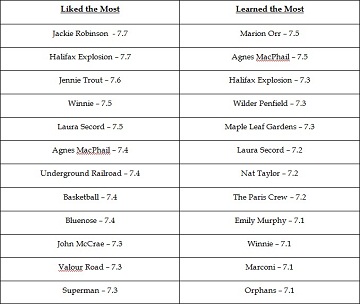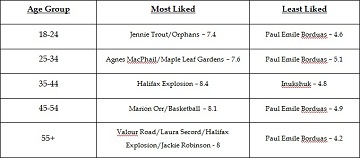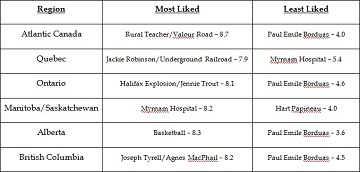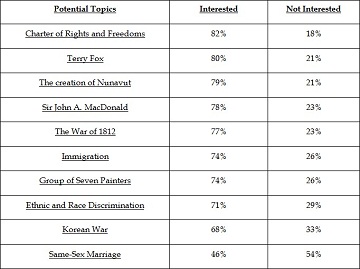Six in Ten Canadians Strongly Agree that Heritage Minutes are a Good Way to Teach Canadians About Our History (63%) and Are Important Vehicles for Telling Canadian Stories (60%)
Two-thirds (64%) of Canadians `strongly agree' that, in general, Canadians don't hear enough about Canadian history, heritage, or achievements. Three in ten (30%) Canadians `somewhat agree' with this statement, while only 6% `disagree' (1% strongly/5% somewhat) overall. A majority (54%) `strongly agree' that they'd like to see more Heritage Minutes produced, as one-third (35%) `somewhat agree' with this sentiment. One in ten (11%) Canadians, however, `disagree' (3% strongly/8% somewhat) that they'd like to see more Heritage Minutes produced.
Six in ten (58%) Canadians `strongly agree' that the Heritage Minutes are of value to Canadians, while one-third (35%) `somewhat agree' with this valuation. Only one in ten (7%) `disagree' (2% strongly/6% somewhat) that the Heritage Minutes are an overall value to Canadians. When it comes to themselves, four in ten (41%) Canadians `strongly agree' that the Heritage Minutes are of value to them, personally, while the same number (41%) `somewhat agree' with this statement. Two in ten (18%) Canadians `disagree' (5% strongly/14% somewhat) that the Heritage Minutes are a personal value to them.
The poll, which surveyed 3,900 Canadians, showed 5-6 randomly selected Heritage Minutes to 13 groups of 300 Canadians and asked respondents to rate, on a scale from 1-10, how much they liked and learned from the videos. The Jackie Robinson (7.7 mean score out of 10), Halifax Explosion (7.7), and Jennie Trout (7.6) Minutes were the most liked, while Canadians learned the most from the Marion Orr (7.5) and the Agnes MacPhail (7.5) Minutes. The following table lists the top 12 Heritage Minutes that Canadians liked and learned the most from:
One interesting finding was the difference in favourite Heritage Minutes by generation. All five age categorizations had different Heritage Minutes that were their favourite. What most generations could agree on, however, was their least favourite Heritage Minute with all Canadians, with the exception of those aged 35-44, saying the Heritage Minute on Paul Emile Borduas. The following table outlines the most liked and least liked Heritage Minute by different age groups:
Favourite Heritage Minutes also differed greatly by region as well. Similarly to the differences in age groups, no regions in Canada shared the same favourite Heritage Minute. The table below outlines the most and least liked Heritage Minutes by region:
Since a resounding majority of Canadians want to see more Heritage Minutes produced, it's important to know who they want to create them and what new topics Canadians want to see. A majority of Canadians say they would like to see the next Heritage Minutes created by emerging Canadian filmmakers (58%) or film students (53%). Others (47%) say they would like to see Heritage Minutes created by established Canadian filmmakers, while one-quarter (24%) want television broadcasters to make them. One in ten (7%) would like to see advertising agencies or none of these choices make the next Heritage Minute, while 3% say they'd prefer other options, specifically mentioning Canadian directors Xavier Dolan, Atom Egoyan, and James Cameron.
Given a list of specific topics not covered by current Heritage Minutes, a majority of Canadians are interested in seeing almost all of the choices given, suggesting that they enjoy the overall concept of the Heritage Minutes. Eight in ten Canadians are `interested' in seeing a Heritage Minute on the Charter of Rights and Freedoms (82%, 44% very/39% somewhat) and Terry Fox (80%, 41% very/39% somewhat). Surprisingly, the most polarizing topic that Canadians are least interested in seeing turned into a Heritage Minute is same-sex marriage. A majority (54%) are `not interested' (26% not at all/28% not very) in seeing a new Heritage Minute on same-sex marriage, compared to a minority (46%) who are `interested' (22% very/24% somewhat). Below is a table of potential topics for new Heritage Minutes and how interested Canadians are in seeing such topics:
Given a list of Canadian celebrities and who they'd most like to see in a new Heritage Minute, Canadians prefer two of the most famous captains in Canadian history. Four in ten would like to see a Heritage Minute starring Wayne Gretzky (44%) or William Shatner (40%). One-quarter of Canadians would like to see a Heritage Minute starring Rachel McAdams (25%), Ryan Gosling (24%), Ryan Reynolds (23%), or Ellen Page (22%), while two in ten (16%) would like to see Seth Rogen in a Heritage Minute. One in ten would like to see Justin Bieber (9%), Taylor Kitsch (7%), or another Canadian star in a Heritage Minute, while one-quarter (25%) would not want to see a Heritage Minute featuring one of these stars.
Given the advances in technology since the heyday of the original Heritage Minutes, Canadians can now watch Heritage Minutes in a number of new ways. Nearly all Canadians (97%) had seen Heritage Minutes on TV, while some even remember seeing the originals in a movie theatre (8%), classroom (4%), or in a library, museum, or heritage space (3%). Two in ten (20%) don't recall where they saw previous Heritage Minutes.
When asked for their preference, a majority (53%) would still prefer to watch all Heritage Minutes on television, while one in ten (7%) would like to watch them all on the internet. 2% would prefer to view all Heritage Minutes in the theatre, while 1% would like to view them all via their tablet or smartphone. Just over one-third (36%) of Canadians, however, would prefer to watch Heritage Minutes in a number of different ways, not just through one medium.
These are some of the findings of an Ipsos Reid poll conducted between August 27 and September 4, 2012, on behalf of the Historica-Dominion Institute. For this survey, a sample of 3,900 Canadians, consisting of 13 groups of 300 respondents each where twelve of the groups were shown 5 Heritage Minute videos and one group was shown 6 videos, from Ipsos' Canadian online panel was interviewed online. Weighting was then employed to balance demographics to ensure that the sample's composition reflects that of the adult population according to Census data and to provide results intended to approximate the sample universe. The precision of Ipsos online polls is measured using a credibility interval. In this case, the poll has a credibility interval of +/- 1.8 percentage points for Canadians in the general population, and +/- 6.5 percentage points for each of the 13 groups. All sample surveys and polls may be subject to other sources of error, including, but not limited to coverage error, and measurement error. For more information on credibility intervals, please visit the Ipsos website at http://ipsos-na.com/dl/pdf/research/public-affairs/IpsosPA_CredibilityIntervals.pdf
For more information on this news release, please contact:
Sean Simpson
Associate Vice President
Ipsos Reid Public Affairs
416.572.4474
[email protected]
About Ipsos Reid
Ipsos Reid is Canada's market intelligence leader, the country's leading provider of public opinion research, and research partner for loyalty and forecasting and modelling insights. With operations in eight cities, Ipsos Reid employs more than 600 research professionals and support staff in Canada. The company has the biggest network of telephone call centres in the country, as well as the largest pre-recruited household and online panels. Ipsos Reid's marketing research and public affairs practices offer the premier suite of research vehicles in Canada, all of which provide clients with actionable and relevant information. Staffed with seasoned research consultants with extensive industry-specific backgrounds, Ipsos Reid offers syndicated information or custom solutions across key sectors of the Canadian economy, including consumer packaged goods, financial services, automotive, retail, and technology & telecommunications. Ipsos Reid is an Ipsos company, a leading global survey-based market research group.
To learn more, please visit www.ipsos.ca.
About Ipsos
Ipsos is an independent market research company controlled and managed by research professionals. Founded in France in 1975, Ipsos has grown into a worldwide research group with a strong presence in all key markets. In October 2011 Ipsos completed the acquisition of Synovate. The combination forms the world's third largest market research company.
With offices in 84 countries, Ipsos delivers insightful expertise across six research specializations: advertising, customer loyalty, marketing, media, public affairs research, and survey management.
Ipsos researchers assess market potential and interpret market trends. They develop and build brands. They help clients build long-term relationships with their customers. They test advertising and study audience responses to various media and they measure public opinion around the globe.
Ipsos has been listed on the Paris Stock Exchange since 1999 and generated global revenues of e1,363 billion (1.897 billion USD) in 2011.
Visit www.ipsos-na.com to learn more about Ipsos' offerings and capabilities.







